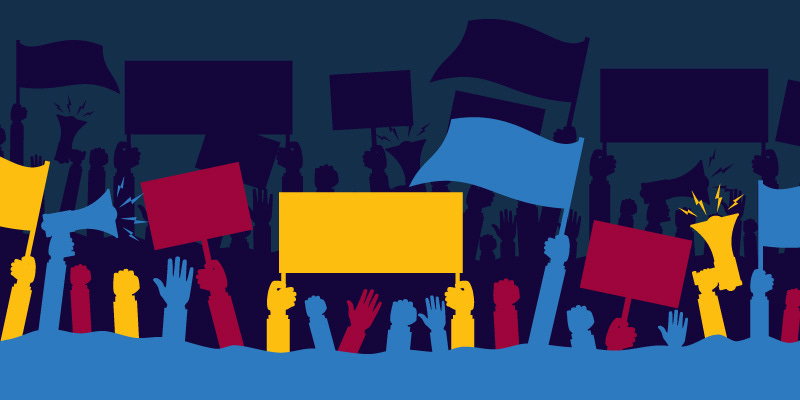The Paradox of Group Polarization
Why we're doomed to hate each other
Yes, social media increase polarization but not for the reason you think...

I thought that our societies were increasingly polarized because we didn’t talk to each other anymore, or at least because we didn’t listen to one another.
I was probably wrong.
Group polarization is a well studied phenomenon in social psychology. Common sense suggests that a group discussion would have a moderating effect on group members. The opposite is true:
However, when researchers looked at groups closely, they discovered many groups shift toward more extreme decisions rather than less extreme decisions after group interaction. Discussion, it turns out, doesn’t moderate people’s judgments after all. Instead, it leads to group polarization: judgments made after group discussion will be more extreme in the same direction as the average of individual judgments made prior to discussion. [Noba]
Group polarization is so strong that the group can be most extreme than its most extreme members:
Similarly, studies have shown that after deliberating together, mock jury members often decided on punitive damage awards that were either larger or smaller than the amount any individual juror had favored prior to deliberation. [Wikipedia]
With online social media it became easier to communicate with a large number of people, engage in conversation, and share opinions. Platforms push you to interact as much as possible, whether it’s a like, a share or a comment. In different studies, it was shown that online discussions “can lead to even higher levels of group polarization compared to traditional meetings”:
One study analyzed over 30,000 tweets on Twitter regarding the shooting of George Tiller, a late term abortion doctor, where the tweets analyzed were conversations among pro-life and pro-choice advocates post shooting. The study found that like-minded individuals strengthened group identity whereas replies between different-minded individuals reinforced a split in affiliation.
Here’s the paradox: Our societies may become more polarized not because we don’t talk to each other but precisely because, thanks to technology, we’re talking to each other more than ever before.
Nothing surprising for behaviorists though. In 1999 (!), American legal scholar Cass Sunstein (author of “Nudge: Improving Decisions about Health, Wealth, and Happiness”) worried:
Many people have expressed concern about processes of social influence on the Internet. The general problem is said to be one of fragmentation, with certain people hearing more and louder versions of their own preexisting commitments, thus reducing the benefits that come from exposure to competing views and unnoticed problems. But an understanding of group polarization heightens these concerns and raises new ones. A “plausible hypothesis is that the Internet-like setting is most likely to create a strong tendency toward group polarization when the members of the group feel some sense of group identity.” If certain people are deliberating with many like-minded others, views will not be reinforced but instead shifted to more extreme points. This cannot be said to be bad by itself – perhaps the increased extremism is good – but it is certainly troublesome if diverse social groups are led, through predictable mechanisms, toward increasingly opposing and ever more extreme views. It is likely that processes of this general sort have threatened both peace and stability in some nations; while dire consequences are unlikely in the United States, both fragmentation and violence are predictable results. As we have seen, group polarization is intensified if people are speaking anonymously and if attention is drawn, through one or another means, to group membership. Many Internet discussion groups have precisely this feature. It is therefore plausible to speculate that the Internet may be serving, for many, as a breeding group for extremism. [The Law of Group Polarization]
As Paul Graham explained in his 2016 essay about The Refragmentation, the internet isn’t the only factor explaining the ongoing polarization. According to him it’s “rather the erosion of forces that had been pushing us together” So this phenomenon deserves further study...
How can we reverse this trend? I unfortunately don’t know. One can read on Wikipedia that: “Research has suggested that well-established groups suffer less from polarization, as do groups discussing problems that are well known to them.”
So the solution to polarization may be… more polarization? If we form smaller fragmented groups—instead of big nations for instance—then once well-established those groups could become more moderate with time? Could a period of “defragmentation” follow? Does human nature and the “law of group polarization” lead to a perpetual cycle of polarization / unification?
I don’t know. But this is another example that learning elementary psychology is essential.
What do you think? Join the conversation! :)
Antoine


What do you thing about the Middle Ages ?
Europe suffered the fall of the Western Roman Empire and shattered into many small kingdoms.
But this meant lots of trouble (war) - at least for a few centuries.
So I don't share your optimism but I still believe Graham is right.
We need "forces pushing us together".
But that usually means a common goal/ennemy.
That's probably (partly) why Trump was so successfull in his attempt to unite the political right.
Another example would be the space race.
I recommend reading about the pax romana tho.